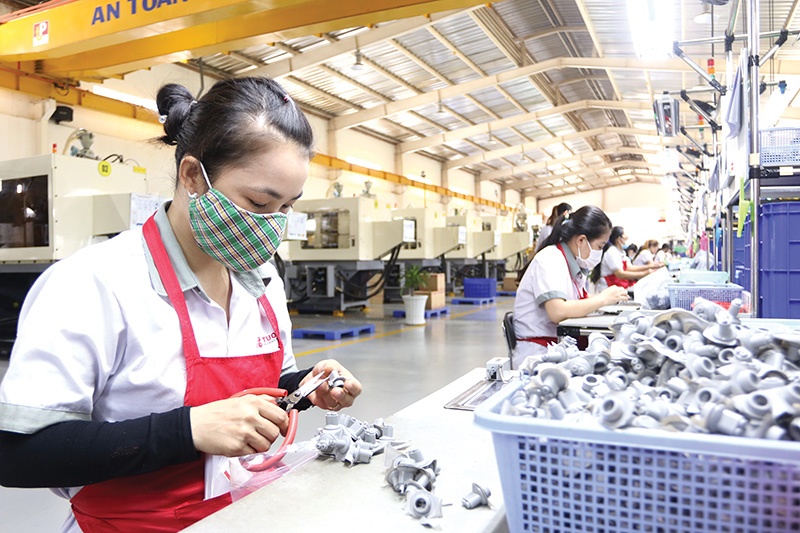Economic status hinges on reopening
 |
| Many companies are operating using only skeleton staff. Photo: Le Toan |
Khoon Goh, head of Asia Research at ANZ, told VIR that unless there is generous government assistance for companies and workers, the negative impact on economic growth could be too great.
“Reopening the economy carries the risk that the spread of the pandemic could worsen to a point where the health system comes under strain and activity is impacted as businesses and households grow cautious. A prolonged lockdown or premature reopening could both result in longer-term damage to the economy’s potential growth,” Goh noted.
Lockdowns and travel restrictions in the south of the country have led to a decline in foreign direct investment (FDI) inflows. Registered FDI capital declined 11.1 per cent on-year in the first seven months of 2021, with the decline reaching 53.8 per cent in July.
Foreign investors have also been feeling the brunt of lockdowns and social distancing. The EuroCham Business Climate Index hit a record low since tracking commenced 10 years ago. The current business climate is at an absolute low, with more than 75 per cent of businesses reporting a gloomy economic situation. Prospects for the next three months are slightly better, but European business leaders still anticipate many challenges ahead.
Meanwhile, a flash survey by the American Chamber of Commerce in Vietnam showed that as of August 25, 13 per cent of respondents had ceased operations or had only skeletal staff, with nearly 50 per cent operating at under 50 per cent of normal capacity. Meanwhile, 20 per cent of American companies have already slashed operations by 51-75 per cent due to the pandemic. If lockdown continues, foreign investor sentiment will only deteriorate further.
Last week, Ho Chi Minh City has decided to extend social distancing measures until the end of September. However, both Hanoi and Ho Chi Minh City are gradually easing restrictions where possible.
Goh said that the priority during reopening should be to boost vaccination as quickly as possible. However, he added, the proportion of fully vaccinated people is still too low.
The Asia-Pacific Sovereigns team of Fitch Ratings explained to VIR that COVID-19 restrictions may weigh on activity in the third quarter of 2021 and could persist as long as the outbreak is not under control. Under this impact, Fitch Ratings’ original 2021 GDP growth forecast of 6 per cent is no longer attainable.
“However, we still expect Vietnam’s GDP performance over 2020-2021 to be the strongest among Fitch-rated sovereigns in ASEAN. Some lost growth momentum may be made up in subsequent quarters as output and social activity normalise, although the risk of further outbreaks will linger as Vietnam’s vaccination rates remain low,” the team wrote.
In the same vein, Tim Evans, CEO of HSBC Vietnam, said that a gradual reopening would start to gather pace from October onwards. The economic outlook by year end very much depends on vaccine rollout and the effective and timely reopening of the economy. He added that as the economy starts to reopen, supply chain challenges should subside, orders will resume, and FDI should also resume its cadence given consistent government policies, a hardworking and resilient workforce, a large number of free trade agreements, and a commitment from the government to spend around 7 per cent of GDP on continuing to develop infrastructure.
Despite the current environment, Evans said Vietnam remains a highly attractive investment destination in the medium term, with robust fundamentals which many investors continue to see through the present COVID-19 volatilities.
South Korean investors who know the market well are continuing their investments. Samsung is set to expand its facilities as early as in the second half of 2021, aiming to ramp up its foldable phone production by 47 per cent to 25 million. Meanwhile LG Display has just received approval for an additional investment of $1.4 billion in its Haiphong plant.
Commenting on the FDI prospects for the country, the Asia-Pacific Sovereigns team of Fitch Ratings wrote, “As we noted in our rating action commentary on Vietnam on April 1, 2021, the bulk of the strong FDI inflows in 2020 went into the manufacturing sector. Net FDI in 2020 was $15.4 billion (about 4 per cent of GDP), close to the previous year’s level. We expect FDI inflows to stay healthy as Vietnam is likely to benefit from the ongoing trade diversion, and also its entry into trade agreements such as the EU-Vietnam Free Trade Agreement and the Regional Comprehensive Economic Partnership.”
What the stars mean:
★ Poor ★ ★ Promising ★★★ Good ★★★★ Very good ★★★★★ Exceptional
Themes: COVID-19
- 67 million children missed out on vaccines because of Covid: UNICEF
- Vietnam records 305 COVID-19 cases on October 30
- 671 new COVID-19 cases recorded on October 1
- Vietnam logs additional 2,287 COVID-19 cases on Sept. 21
- People’s support decisive to vaccination coverage expansion: official
Related Contents
Latest News
More News
- VNPAY and NAPAS deepen cooperation on digital payments (February 11, 2026 | 18:21)
- Vietnam financial markets on the rise amid tailwinds (February 11, 2026 | 11:41)
- New tax incentives to benefit startups and SMEs (February 09, 2026 | 17:27)
- VIFC launches aviation finance hub to tap regional market growth (February 06, 2026 | 13:27)
- Vietnam records solid FDI performance in January (February 05, 2026 | 17:11)
- Manufacturing growth remains solid in early 2026 (February 02, 2026 | 15:28)
- EU and Vietnam elevate relations to a comprehensive strategic partnership (January 29, 2026 | 15:22)
- Vietnam to lead trade growth in ASEAN (January 29, 2026 | 15:08)
- Japanese business outlook in Vietnam turns more optimistic (January 28, 2026 | 09:54)
- Foreign leaders extend congratulations to Party General Secretary To Lam (January 25, 2026 | 10:01)

 Tag:
Tag:




















 Mobile Version
Mobile Version